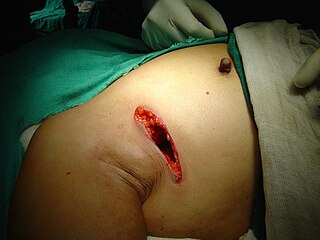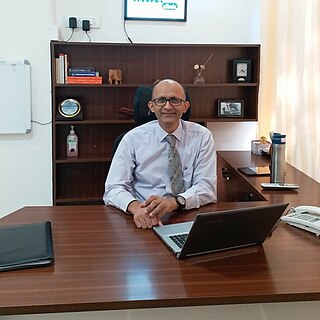Related Research Articles

General surgery is a surgical specialty that focuses on alimentary canal and abdominal contents including the esophagus, stomach, small intestine, large intestine, liver, pancreas, gallbladder, appendix and bile ducts, and often the thyroid gland. They also deal with diseases involving the skin, breast, soft tissue, trauma, peripheral artery disease and hernias and perform endoscopic as such as gastroscopy, colonoscopy and laparoscopic procedures.

Neurosurgery or neurological surgery, known in common parlance as brain surgery, is the medical specialty concerned with the surgical treatment of disorders which affect any portion of the nervous system including the brain, spinal cord and peripheral nervous system.

Otorhinolaryngology is a surgical subspeciality within medicine that deals with the surgical and medical management of conditions of the head and neck. Doctors who specialize in this area are called otorhinolaryngologists, otolaryngologists, head and neck surgeons, or ENT surgeons or physicians. Patients seek treatment from an otorhinolaryngologist for diseases of the ear, nose, throat, base of the skull, head, and neck. These commonly include functional diseases that affect the senses and activities of eating, drinking, speaking, breathing, swallowing, and hearing. In addition, ENT surgery encompasses the surgical management of cancers and benign tumors and reconstruction of the head and neck as well as plastic surgery of the face, scalp, and neck.

Radiation therapy or radiotherapy is a treatment using ionizing radiation, generally provided as part of cancer therapy to either kill or control the growth of malignant cells. It is normally delivered by a linear particle accelerator. Radiation therapy may be curative in a number of types of cancer if they are localized to one area of the body, and have not spread to other parts. It may also be used as part of adjuvant therapy, to prevent tumor recurrence after surgery to remove a primary malignant tumor. Radiation therapy is synergistic with chemotherapy, and has been used before, during, and after chemotherapy in susceptible cancers. The subspecialty of oncology concerned with radiotherapy is called radiation oncology. A physician who practices in this subspecialty is a radiation oncologist.

Urology, also known as genitourinary surgery, is the branch of medicine that focuses on surgical and medical diseases of the urinary-tract system and the reproductive organs. Organs under the domain of urology include the kidneys, adrenal glands, ureters, urinary bladder, urethra, and the male reproductive organs.
A radiation oncologist is a specialist physician who uses ionizing radiation in the treatment of cancer. Radiation oncology is one of the three primary specialties, the other two being surgical and medical oncology, involved in the treatment of cancer. Radiation can be given as a curative modality, either alone or in combination with surgery and/or chemotherapy. It may also be used palliatively, to relieve symptoms in patients with incurable cancers. A radiation oncologist may also use radiation to treat some benign diseases, including benign tumors. In some countries, radiotherapy and chemotherapy are controlled by a single oncologist who is a "clinical oncologist". Radiation oncologists work closely with other physicians such as surgical oncologists, interventional radiologists, internal medicine subspecialists, and medical oncologists, as well as medical physicists and technicians as part of the multi-disciplinary cancer team. Radiation oncologists undergo four years of oncology-specific training whereas oncologists who deliver chemotherapy have two years of additional training in cancer care during fellowship after internal medicine residency in the United States.

A bone tumor is an abnormal growth of tissue in bone, traditionally classified as noncancerous (benign) or cancerous (malignant). Cancerous bone tumors usually originate from a cancer in another part of the body such as from lung, breast, thyroid, kidney and prostate. There may be a lump, pain, or neurological signs from pressure. A bone tumor might present with a pathologic fracture. Other symptoms may include fatigue, fever, weight loss, anemia and nausea. Sometimes there are no symptoms and the tumour is found when investigating another problem.

Breast-conserving surgery refers to an operation that aims to remove breast cancer while avoiding a mastectomy. Different forms of this operation include: lumpectomy (tylectomy), wide local excision, segmental resection, and quadrantectomy. Breast-conserving surgery has been increasingly accepted as an alternative to mastectomy in specific patients, as it provides tumor removal while maintaining an acceptable cosmetic outcome. This page reviews the history of this operation, important considerations in decision making and patient selection, and the emerging field of oncoplastic breast conservation surgery.
An orthopedic (orthopaedic) oncologist is a physician and surgeon who specializes in the diagnoses and treatment of primary benign and malignant tumors of the bones.
Geriatric oncology is a branch of medicine that is concerned with the diagnosis and treatment of cancer in the elderly, usually defined as aged 65 and older. This fairly young but increasingly important subspecialty incorporates the special needs of the elderly into the treatment of cancer.

Oncology is a branch of medicine that deals with the study, treatment, diagnosis, and prevention of cancer. A medical professional who practices oncology is an oncologist. The name's etymological origin is the Greek word ὄγκος (ónkos), meaning "tumor", "volume" or "mass". Oncology is concerned with:
Interventional oncology is a subspecialty field of interventional radiology that deals with the diagnosis and treatment of cancer and cancer-related problems using targeted minimally invasive procedures performed under image guidance. Interventional oncology has developed to a separate pillar of modern oncology and it employs X-ray, ultrasound, computed tomography (CT) or magnetic resonance imaging (MRI) to help guide miniaturized instruments to allow targeted and precise treatment of solid tumours located in various organs of the human body, including but not limited to the liver, kidneys, lungs, and bones. Interventional oncology treatments are routinely carried out by interventional radiologists in appropriate settings and facilities.

Northern Westchester Hospital (NWH), now known as Northwell Health, is a not-for-profit, 245-bed, all-private-room facility in Mount Kisco, New York. Founded in 1916, it serves residents of Northern Westchester, Putnam County and southern Dutchess County, as well as parts of Fairfield County, Connecticut.
Sonja Eva Singletary was an American surgeon who specialized in the care of breast cancer. She was a faculty member at the University of Texas MD Anderson Cancer Center and a past president of the Society of Surgical Oncology.

Sandeep Nayak is an Indian surgical oncologist based in Bangalore, India, known as the pioneer of robotic thyroidectomy technique called RABIT and Minimally Invasive Neck Dissection. He is the founder of MACS Clinic, Bangalore. He is the Senior Director and the Head of Department of surgical oncology at Fortis Hospital, Bangalore. Nayak was recipient of the KS International Innovation Award for his technique of RIA-MIND andTimes Health Excellence Award for 2018 by The Times of India. Nayak is the member of Royal College of Surgeons of Edinburgh and American Society of Clinical Oncology. He has previously held the position of the assistant professor at Kidwai Memorial Institute of Oncology from 2012 to 2017. Nayak has been constantly ranked among the top oncologists in India
Anne Louise Rosenberg is an American surgical oncologist retired from practice in Cherry Hill, New Jersey.
Emilia Dauway MD, FACS, FRACS is an American trained surgeon who is practicing general, breast and oncologic surgery in Australia. Dauway was co-inventor of the use of radioactive seeds in the breast to localise non-palpable breast cancers and the first in Australia to use magnetic seeds instead of radioactive seeds. This technique replaces hookwire or needle localisation improving patient safety, outcomes and satisfaction. The method was patented by the University of South Florida while Dauway was a fellow of surgical oncology. The method has been used since 1999 and has improved with the development of modern equipment. Dauway is also a Yoga Instructor, a Keynote speaker and is founder/director of Restore More, a non-profit initiative which provides education and funding to women in regional and geographically disadvantaged areas for breast cancer treatment and reconstruction.

Armando Elario Giuliano is a surgical oncologist, surgeon scientist and medical professor in Los Angeles, California, United States of America. He is the Linda and Jim Lippman Chair in Surgical Oncology and co-director of Saul and Joyce Brandman Breast Center at Cedars-Sinai Medical Center, Los Angeles.

The Bhagwan Mahaveer Cancer Hospital and Research Centre (BMCHRC) is located in Jawahar Lal Nehru Marg, Bajaj Nagar, Jaipur, Rajasthan. It is also popularly known as BMCHRC. The hospital is NABH and NABL accredited super speciality cancer treatment centre. The hospital is following international protocol for cancer treatment managed by K.G. Kothari Memorial Trust. The centre is committed to providing comprehensive care along with prevention and research in cancer.
Timothy Michael Pawlik is an American surgical oncologist. He is Chair of the Department of Surgery and the Urban Meyer III and Shelley Meyer Chair for Cancer Research at The Ohio State University and Surgeon-in-Chief at The Ohio State University Wexner Medical Center.
References
- ↑ "New Certificate in Complex General Surgical Oncology | American Board of Surgery". www.absurgery.org. Retrieved 2016-11-03.
- ↑ "Editorial Note on Carcinoma | Oncology and Case Report" (PDF). www.iomcworld.org.
- ↑ Surgical Oncology Fellowship Training Programs
- ↑ "Surgical Oncology Education".
- ↑ Surgical Oncology Program Clinical Trials
- ↑ "How Surgery Is Used for Cancer". American Cancer Society. Retrieved 22 Sep 2020.
- ↑ How Surgery Is Used for Cancer American Cancer Society.
- ↑ Special Surgical Techniques American Cancer Society.
- ↑ O'Connell, Theodore (1981). Surgical Oncology. G. K. Hall & Co., Boston, Mass. ISBN 9780816121571.